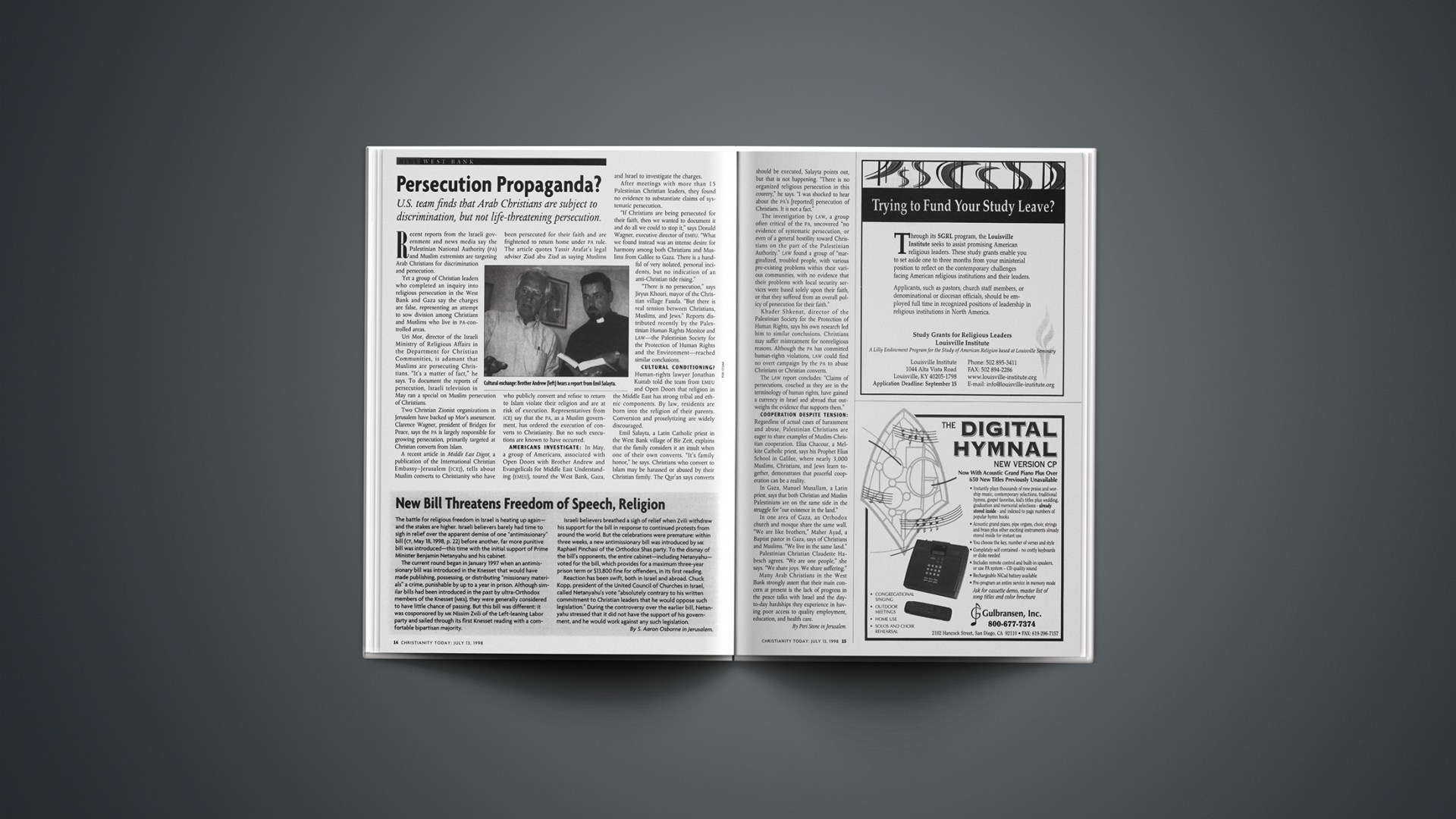Recent reports from the Israeli government and news media say the Palestinian National Authority (PA) and Muslim extremists are targeting Arab Christians for discrimination and persecution.
Yet a group of Christian leaders who completed an inquiry into religious persecution in the West Bank and Gaza say the charges are false, representing an attempt to sow division among Christians and Muslims who live in PA-controlled areas.
Uri Mor, director of the Israeli Ministry of Religious Affairs in the Department for Christian Communities, is adamant that Muslims are persecuting Christians. “It’s a matter of fact,” he says. To document the reports of persecution, Israeli television in May ran a special on Muslim persecution of Christians.
Two Christian Zionist organizations in Jerusalem have backed up Mor’s assessment. Clarence Wagner, president of Bridges for Peace, says the PA is largely responsible for growing persecution, primarily targeted at Christian converts from Islam.
A recent article in Middle East Digest, a publication of the International Christian Embassy-Jerusalem (ICEJ), tells about Muslim converts to Christianity who have been persecuted for their faith and are frightened to return home under PA rule. The article quotes Yassir Arafat’s legal adviser Ziad abu Ziad as saying Muslims who publicly convert and refuse to return to Islam violate their religion and are at risk of execution. Representatives from ICEJ say that the PA, as a Muslim government, has ordered the execution of converts to Christianity. But no such executions are known to have occurred.
AMERICANS INVESTIGATE: In May, a group of Americans, associated with Open Doors with Brother Andrew and Evangelicals for Middle East Understanding (EMEU), toured the West Bank, Gaza, and Israel to investigate the charges.
After meetings with more than 15 Palestinian Christian leaders, they found no evidence to substantiate claims of systematic persecution.
“If Christians are being persecuted for their faith, then we wanted to document it and do all we could to stop it,” says Donald Wagner, executive director of EMEU. “What we found instead was an intense desire for harmony among both Christians and Muslims from Galilee to Gaza. There is a handful of very isolated, personal incidents, but no indication of an anti-Christian tide rising.”
“There is no persecution,” says Jiryus Khouri, mayor of the Christian village Fasula. “But there is real tension between Christians, Muslims, and Jews.” Reports distributed recently by the Palestinian Human Rights Monitor and LAW—the Palestinian Society for the Protection of Human Rights and the Environment—reached similar conclusions.
CULTURAL CONDITIONING? Human-rights lawyer Jonathan Kuttab told the team from EMEU and Open Doors that religion in the Middle East has strong tribal and ethnic components. By law, residents are born into the religion of their parents. Conversion and proselytizing are widely discouraged.
Emil Salayta, a Latin Catholic priest in the West Bank village of Bir Zeit, explains that the family considers it an insult when one of their own converts. “It’s family honor,” he says. Christians who convert to Islam may be harassed or abused by their Christian family. The Qur’an says converts should be executed, Salayta points out, but that is not happening. “There is no organized religious persecution in this country,” he says. “I was shocked to hear about the PA’s [reported] persecution of Christians. It is not a fact.”
The investigation by LAW, a group often critical of the PA, uncovered “no evidence of systematic persecution, or even of a general hostility toward Christians on the part of the Palestinian Authority.” LAW found a group of “marginalized, troubled people, with various pre-existing problems within their various communities, with no evidence that their problems with local security services were based solely upon their faith, or that they suffered from an overall policy of persecution for their faith.”
Khader Shkenat, director of the Palestinian Society for the Protection of Human Rights, says his own research led him to similar conclusions. Christians may suffer mistreatment for nonreligious reasons. Although the PA has committed human-rights violations, LAW could find no overt campaign by the PA to abuse Christians or Christian converts.
The LAW report concludes: “Claims of persecutions, couched as they are in the terminology of human rights, have gained a currency in Israel and abroad that outweighs the evidence that supports them.”
COOPERATION DESPITE TENSION: Regardless of actual cases of harassment and abuse, Palestinian Christians are eager to share examples of Muslim-Christian cooperation. Elias Chacour, a Melkite Catholic priest, says his Prophet Elias School in Galilee, where nearly 3,000 Muslims, Christians, and Jews learn together, demonstrates that peaceful cooperation can be a reality.
In Gaza, Manuel Musallam, a Latin priest, says that both Christian and Muslim Palestinians are on the same side in the struggle for “our existence in the land.”
In one area of Gaza, an Orthodox church and mosque share the same wall. “We are like brothers,” Maher Ayad, a Baptist pastor in Gaza, says of Christians and Muslims. “We live in the same land.”
Palestinian Christian Claudette Habesch agrees. “We are one people,” she says. “We share joys. We share suffering.”
Many Arab Christians in the West Bank strongly assert that their main concern at present is the lack of progress in the peace talks with Israel and the day-to-day hardships they experience in having poor access to quality employment, education, and health care.
Copyright © 1998 Christianity Today. Click for reprint information.










